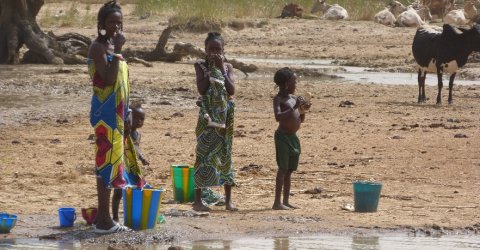
Gender-specific roles and water collection in the wetlands of Burkina Faso
The Burkina Faso National Policy for Wetlands identifies 1,794 natural and artificial wetlands within the country, including 18 Ramsar Sites. These wetlands receive water, store it, purify it, transport and distribute it from upstream to downstream in catchment basins. A basis for the earliest civilisations, water is an important resource for the survival of all forms of life. In Burkina Faso, the use of water varies depending on the gender of the collector. The collection and management of water by women and girls ensures its availability for domestic use.
Advances made in women’s emancipation have not affected the energy they invest in collecting water. For domestic purposes, water collection remains a purely female task. The Ouagadougou Population Observatory (OPO) revealed in 2012 that in five households out of every six in the city of Ouagadougou, the person responsible for fetching water was a woman aged 26 or older. Water collected by women in wetlands is primarily intended for household consumption (drinking water, processing non-timber forest products, dyeing) and vegetable gardening. Men, on the other hand, use water for social and community infrastructure (brick-making for construction of dwellings, granaries, places of worship, etc.), breeding of domestic animals and cultivation of cash crops. Unlike women’s water usage, water usage by men tends to generate income.
In Burkina Faso, the use of water in wetlands differs either side of a north-south dividing line. In the north, the key economic activity is livestock rearing, which is practised by both genders; whereas in the south, men undertake forestry and extensive irrigated agriculture. Around and in the sites of mining activity established near wetlands, water collection is largely done by men, to be sold to the miners.
These gender disparities in water collection in wetlands are likely to be linked to the history of the country, and to some long-established socio-cultural constraints which still operate. For example in Lake Dem (listed as a Ramsar Site on 1982), in the central plateau where the Mossi are the largest ethnic group, there is a saying that "a good wife is one whose jar never runs out of drinking water". In the Sahel region, with its drier climate and in light of recurrent freshwater shortages, both genders work with livestock and dedicate themselves to collecting water primarily for human and animal consumption.
Men and women, in their respective roles, have different challenges with regard to the collection and management of water in the wetlands of Burkina Faso. A good understanding of these challenges enables coordinated management of water resources and the associated ecosystems, for economic and social well-being and for sustaining biological and cultural diversity.
By Aïcha Tapsoba (Environmental Economist, INERA-DPF) and Paul Ouédraogo (Ecologist, Senior Advisor for Africa, Ramsar Convention Secretariat)